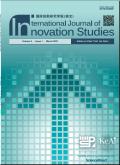知识流入和流出对新产品开发项目绩效的影响
IF 5.3
Q2 MANAGEMENT
引用次数: 0
摘要
近年来的研究表明,企业不能完全依靠自身的创新能力来获得竞争优势,开放式创新是企业通过知识的流入和流出与外部合作伙伴分享创新过程的战略。一些研究试图考察成骨不全的背景及其对公司绩效的贡献。然而,很少有研究关注项目团队层面。本研究的目的是分析两种OI流(流入和流出)对新产品开发(NPD)绩效的影响,并研究流出OI在流入OI与项目绩效关系中的中介作用。本研究以巴西制造业为研究对象,涉及各行业242个项目,采用PLS-SEM方法对研究模型进行分析。结果表明,出站OI与项目绩效呈正相关,入站OI与项目绩效呈负相关。此外,当入站OI的贡献由出站OI介导时,它对项目绩效有间接的积极影响。中介结果表明,当入站OI将知识“推”给项目团队时,出站OI“拉”出来自第一个流的知识。本文章由计算机程序翻译,如有差异,请以英文原文为准。
The impact of knowledge inflows and outflows on NPD project performance
Recent research indicates that companies cannot rely exclusively on their own innovation power to achieve a competitive advantage, and open innovation (OI) represents the strategy for companies to share their innovation process with external partners through knowledge inflows and outflows. Several studies have sought to examine the background of OI and its contribution to firm-level performance. However, few studies have focused on the project team level. The objective of this research is to analyze the impact of two OI flows (inbound and outbound) concerning new product development (NPD) performance, and to study the mediator role of outbound OI in the relation between inbound OI and project performance. This study examines the Brazilian manufacturing industry, involving 242 projects from various industrial sectors, and employs the PLS-SEM method to analyze the research model. The results indicate that outbound OI has a positive relation with project performance, while inbound OI has a negative contribution. In addition, inbound OI has an indirect positive effect on project performance when its contribution is mediated by outbound OI. The mediation results indicate that while inbound OI "pushes" knowledge to project teams, outbound OI "pulls" knowledge originating from the first flow.
求助全文
通过发布文献求助,成功后即可免费获取论文全文。
去求助
来源期刊

International Journal of Innovation Studies
Business, Management and Accounting-Strategy and Management
CiteScore
8.10
自引率
0.00%
发文量
23
审稿时长
19 weeks
 求助内容:
求助内容: 应助结果提醒方式:
应助结果提醒方式:


